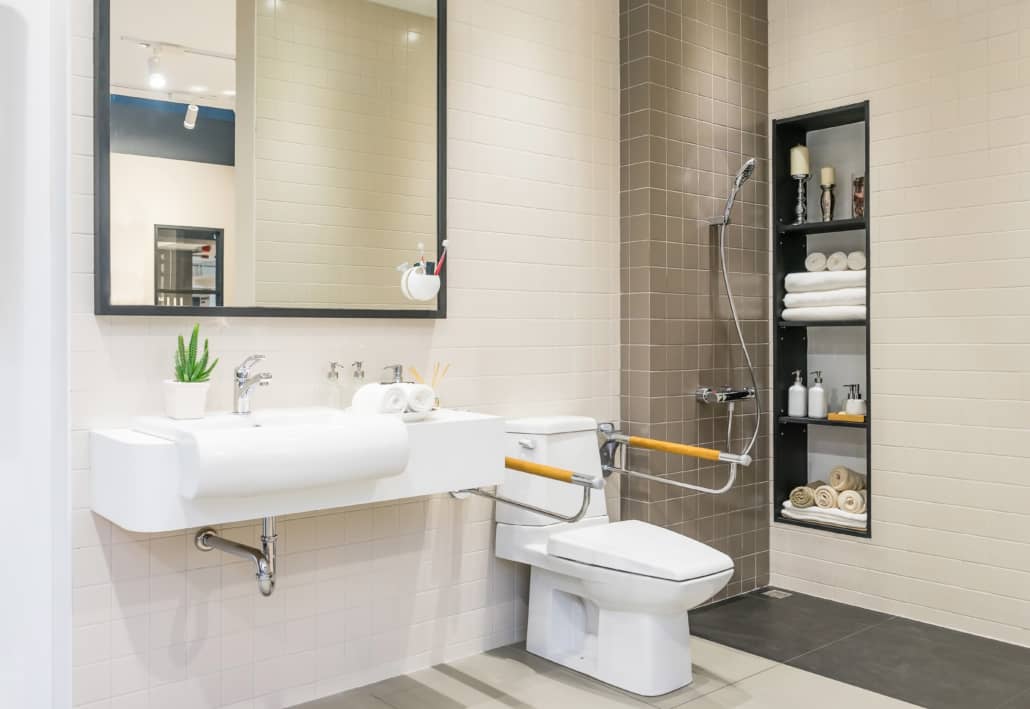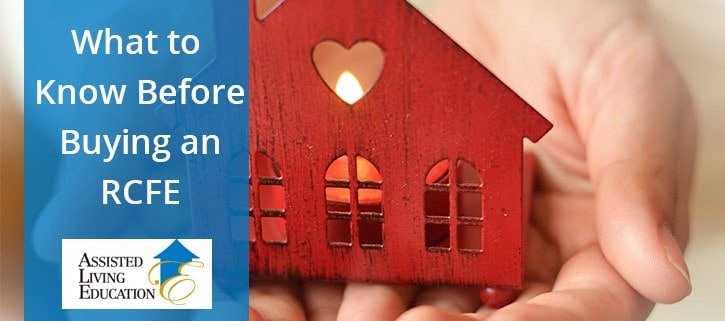What to Know Before Buying an RCFE
As America ages, it goes without saying that the assisted living business will be blooming for years to come. Buying an RCFE is an enticing venture. It’s no wonder we see new facilities popping up all around us – most of them doing quite well.
Investment groups and private owners are buying existing homes, building out new locations, and/or expanding the facilities they already have – all to meet the ever-growing demand.
Before Buying an RCFE
There is a wealth of information to consider when delving into the world of purchasing an RCFE (Residential Care Facility for the Elderly).
Acquiring an existing RCFE and anticipating a guaranteed profit is considerably more challenging than it may initially seem. However, with astute decision-making and a well-informed approach to the purchase, it has the potential to become a judicious and lucrative investment.
In this article, we will look at many of the questions you should be asking yourself and your advisors during the evaluation process of purchasing an existing RCFE.
Starting an Assisted Living Business
Indeed, there are many trips and traps when buying an RCFE. Of course, we all know that not all RCFE’s are created equal. Still, you have to ask yourself; where do I start, what should I be looking for, and what are the major red flags?
Suffice it to say, there are many factors you must take seriously as well as a number of pitfalls – and, yes, as they say; “the devil is in the details.” When it comes to purchasing an RCFE, sometimes referred to a Board and Care Facility, or Assisted Living Home, you’ll need guidance and a solid strategy.
Additionally, you or your RCFE administrator will need an assisted living administrator license.
First things first – you need to know what you are looking for.
What Size and Type of RCFE Would You Like to Purchase?
Let’s get the terms straight, so we are all on the same page here. What are the differences between an RCFE, Assisted Living Home, Rest Home, and Board and Care Facility? Essentially, they are all the same type of facility, just older terms being used. As far as the State of California is concerned, when it comes to licensing, the facility is an RCFE. All of these facilities must have the RCFE License to operate legally.
Out in the real world, most RCFEs are smaller, with under 15-beds, and most are privately owned, often the owners live nearby.. The larger Assisted Living facilities generally have corporations and investment company owners. These facilities are easily recognizable and usually come with private apartments (rooms) and different resident packages.
Licensed RCFEs can provide non-medical assistance such as eating, incontinence care, dressing, personal hygiene, ambulation assistance, and supervision and observation. Staff can also assist with self-administration of medications as prescribed by a physician. These facilities are not required to have a physician or licensed nurses on their staff.
Consider Why the Owner is Selling Their Facility in the First Place
If Residential Care Facilities for the Elderly are such a good business model, then why on earth is the owner selling?
Profitability
Do they have multiple facilities and want to sell their less attractive facility, while keeping their flagship or profitable operations? Are the owners retiring themselves and don’t have heirs to take over the business, thus, just want to cash out? Is the facility rundown? Maybe owners don’t wish to invest in needed upgrades. Is the facility borderline and worried about licensing requirements and future inspections? Has the RCFE ever been licensed?
Compliance
Has the facility been cited before for lapses in their mandatory compliance or is it at risk of license revocation? Have the owners been called into formal administrative hearings for non-compliance? Title 22 regulations are serious business; is the facility in chronic violation? How does the facility handle its compliance obligations and record-keeping? It’s easy to get into the ‘digital record-keeping doghouse’ in CA, a place no RCFE wants to be. Does the facility have a good reputation with the DSS – Department of Social Services? These are a lot of questions, but these are all good things to know before you start making any offers.
Condition
It’s also important to look at the current residents and staff and their living/work conditions.
Does the facility look clean? If you were a state inspector would you pass it for health and safety? What do their records show from previous inspections? Has the facility been paying the staff properly and recording overtime in a legitimate fashion? Are all members of the staff legal US citizens or have work VISAs?
Again, if everything is on the up-and-up, try and gain an understanding as to why the owner is parting ways with their investment and make sure that they are not trying to pass on their pitfall to a new unsuspecting owner.
Remember: You are Buying an RCFE Business Not Just Real Estate
Yes, while it is true that real estate can be a good investment over time and a hedge against future inflation, buying an RCFE is more about buying a business.
Real Estate Considerations
Real estate should be a secondary consideration. In fact, if you separate out the two, and look at real estate as one investment and the business as the other, you’ll have a clearer picture. Can real estate stand on its own merit as a viable investment; long-term hold, or fix and flip? Can you afford to buy and hold the real estate if the RCFE doesn’t make a profit on its own?
Post-Purchase Considerations
How will you pay for it all if you lose the residents due to the change in ownership? There will be some attrition when new owners take over, the average is 20-30% – can you deal with that, at a time when you are planning to spend on new upgrades?
What is your plan and do you have what you need to execute it? What if all the residents move out? Will the sellers consider a ‘claw back’ clause in the purchase agreement in the case that happens? Will the current owners stay on board for a while ensuring a smooth transition? Are the current owners a problem, perhaps you don’t want them anywhere near the facility?
Location Considerations When Buying an RCFE
How is the neighborhood? Are the surrounding neighbors happy with the facility? Have there been issues? Will they turn-out and speak against your future plans of expansion, upgrades or filings at the local planning commission as you try to get your construction or remodeling projects approved?
If the neighborhood itself is rundown, will this prevent you from attracting residents? Could this prevent you from commanding a fair and reasonable market price for those who come to stay?
Is the RCFE Profitable?
Another important factor to evaluate is if the facility is currently financially stable. Consider if most of the residents are SSI (Supplemental Security Income) residents.
Consider this: You should bear in mind that once SSI residents are in place, eviction becomes virtually impossible, and significant price increases are also unlikely. If the facility is currently not profitable or barely breaking even, how will you manage future expenses for repairs, upgrades, and compliance with upcoming regulations?

Expansion and Cash Flow
Before making a decision, consider the following aspects: Will expanding the facility lead to improved revenue? Are you able to renovate and add-on to the facility? Can you finance these changes from the cash flow generated by the business?
Take a close look at the cash flow and payment timeliness of the residents. Are payments made promptly, or do some pay late? Have the current owners allowed late payments in the past? Are all residents paying similar rates, or have special deals been made for a few of them? Ensure all payments are legitimate, as off-the-books cash payments can complicate revenue proof and financing during your purchase.
Additionally, assess the involvement of the current owners and their family members. If family members are working, are they being paid as regular employees, and is this properly accounted for? Be prepared for possible changes in costs when you take over, especially if you need to hire more staff to maintain the same level of care for the residents.
If you plan on substantial upgrades, research local building codes, restrictions, and zoning regulations for Residential Care Facilities for the Elderly in the specific area of the city. Keep in mind that California cities often have specific rules and building codes for such facilities.
By thoroughly examining these factors, you can make a well-informed decision when considering the purchase of an RCFE.
Competition
What other competition is in the area? Are there new, larger corporate-owned Assisted Living facilities opening nearby, offering low-introductory deals?
In essence, can you compete effectively with the well-established giants? – These well-financed RCFE’s have spacious, modern facilities, lots of amenities, cost advantages due to economies of scale, paid referral recruitment programs, and prime locations.
If the business is currently profitable, fully compliant with regulations, and has a robust strategic plan, there is a good chance it can compete even in the face of such formidable competition.
Are the RCFE’s Facilities Well Maintained?
Title 22 provides specific guidelines for licensing Residential Care Facilities for the Elderly (RCFEs). In particular, Title 22, section 87303 outlines the requirements for Maintenance and Operations of these facilities. Inspections occur annually, and failure to comply can lead to significant problems. A facility wants to avoid being labeled as ‘problematic’ by an inspector, as this reputation spreads quickly and can escalate out of control.
When considering the purchase of an Assisted Living Home, Board and Care Facility, or RCFE, it is essential to meticulously scrutinize the facility as if you were a Licensing Program Analyst from DSS.
Remember, once you purchase the facility, any of the existing problems with the building structure you see, will instantly become yours.
Can I Just Buy a Home and Turn It into an RCFE?
Yes, this is another option.
Starting an assisted living business involves obtaining licensing, which takes time to complete before the facility can become operational. To embark on this path, you’ll need a comprehensive business plan and the guidance of an experienced consultant who has navigated this process before – someone who understands the challenges that lie ahead.
Starting a new RCFE requires more initial working capital, but you won’t have to bear the cost of ‘goodwill’ or pay a multiple of the annual gross revenue, as is the case when purchasing an existing RCFE. You must factor in the expenses and time associated with RCFE licensing, hiring staff, marketing efforts, and implementing a top-notch compliance system.
The main advantage of starting anew is the freedom to build the facility according to your vision, incorporating the most efficient and modern methodologies. This is indeed achievable with the right approach. If executed correctly, it could prove to be the best option for you. Take some time to contemplate this option while exploring the market and examining the available RCFEs for sale.

Final Thoughts
We know that we have provided more questions than answers in this article. This was by design.
Embarking on a journey to purchase an RCFE is one filled with questions that need to be answered and sometimes the hardest part is knowing what the right questions to ask are.
Hopefully, this article has given you some insight into that. If you find that you still need further guidance and/or consulting, our expert team is here to help you. Good luck and happy shopping!
Assisted Living Education is the leading provider of RCFE license application services, classes, products and services for assisted living. Our teachers are industry professionals with years of experience, engaging, entertaining and highly informative.
People Also Ask:
Who regulates RCFE in California?
The California Department of Social Services (DSS), Community Care Licensing Division (CCLD), and Continuing Care Contracts Branch regulates RCFEs and is responsible for periodic inspections to ensure compliance with California law.
Is RCFE the same as a board and care?
Residential Care Facilities are non-medical facilities for seniors that can include assistance with everyday living activities.





